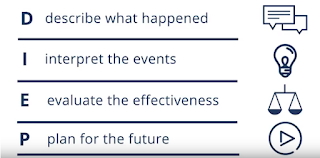Currently, I can identify two communities of practice I am involved in. Wenger (2000) describes a community of practice as having three main components: a sense of shared enterprise, mutual engagement and the development of communal resources. I think two of the communities I belong to fit that definition.
First would be the NZAJLT (New Zealand Association of Japanese Language Teachers) who don't meet in person often but do communicate regularly online. Our community contains a forum for problems and questions shared and solutions offered by members, building mutual trust and contributing to shared resources.
Second would be the eLearning Professional Learning Group I am involved with at school. This group meets about twice a term and our shared domain is to promote responsible and current eLearning practices within our school. Members of the group share best practice with each other and run workshops for staff which they can choose to attend.
I have yet to decide on a topic for my inquiry. Last week while thinking about personalised learning I thought that in future I should include more goal setting with students to build individual pathways to suit their needs, and this could become part of an inquiry. A wise friend who commented on my post pointed out that group goals could be more attainable, and I think she is onto something.
I had already been considering including gamification in my Year 10 course next year and I think following the steps I learnt about last week to make the learning more personalised, it will fit in well with a gamified course. I didn’t want to just separate tasks into “must do, could do” as I think some people would stop at the must do and not go any further. But perhaps if we work together to set clear, achievable goals for our learning and introduce the added incentives that gaming produces, it could keep everyone engaged.
Our school uses Schoology as a Learning Management System. It has a built in markbook and it also has the ability to assign badges to students for any achievement. If any readers are Schoology users and / or have experience with gamification I would love if you could share some ideas with me. This topic would be something I could share with my eLearning community at school.
My other idea was to look into how to use technology tools to encourage more quantity and quality in my students’ Japanese writing. This year we have had Dr Ian Hunter at our school to run workshops around the “Write that essay” programme. He showcased the online tool they use which gives examples of types of sentences and provides scaffolding such as writing templates. This programme has enjoyed huge success in both increasing the output of student writing and also the quality of their work and I am interested in finding out if the same concepts can apply in other languages.
As part of this inquiry I would need to develop the templates and other materials such as help sheets for Japanese myself. I can see how some of the tools we have seen and used in the Mind Lab course could be useful here, along with some ideas from the ULearn conference I attended in October. This topic would be of more interest to my Japanese teaching colleagues so I could share my findings and related resources I create with my NZALT community.
Or maybe I’ll think of something else entirely! The great thing about teaching in New Zealand is that we have a lot of flexibility and freedom in our curriculum design so the sky’s the limit when it comes to inquiry.
References
Wenger, E.(2000). Communities of practice and social learning systems. Organization,7(2), 225-246.
Write that Essay is a ground-breaking academic writing programme transforming writing outcomes in schools today.
Developed by educator and author Dr Ian Hunter, the programme is anchored in Dr Ian’s unique skill-based approach to the cross-curriculum development of writing ability.

